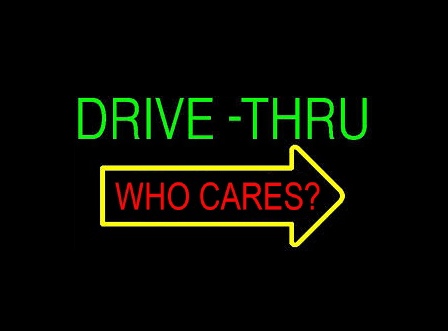Slower fast food drive-thru times may indicate less of a shit given
 With the furious pace of America’s dumbing down, de-skilling, and low-waging, it’s no surprise that drive-thru speed of service is suffering. Yet after catching sight of a pedestrian nursing a chocolate shake, his facial expression as blank as a feeding infant’s, it suddenly becomes critical that I not have to wait too long for my own. The notion now planted, the countdown from image to intake shouldn’t be longer than six minutes, and two have been annoyingly consumed by the two block drive.
With the furious pace of America’s dumbing down, de-skilling, and low-waging, it’s no surprise that drive-thru speed of service is suffering. Yet after catching sight of a pedestrian nursing a chocolate shake, his facial expression as blank as a feeding infant’s, it suddenly becomes critical that I not have to wait too long for my own. The notion now planted, the countdown from image to intake shouldn’t be longer than six minutes, and two have been annoyingly consumed by the two block drive.
 When I finally reach the drive-thru, I’m certain that anything beyond four more minutes would be un-American. So the foreign-American up there pulling various levers and pushing little buttons is just going to have to snap it up. But wait! That’s not a compliant brown person at the window: it’s an uppity white kid! What’s he doing here? Oh, right, he’s one of those college grads pushing lower-skilled workers and immigrants even further down the occupational staircase.
When I finally reach the drive-thru, I’m certain that anything beyond four more minutes would be un-American. So the foreign-American up there pulling various levers and pushing little buttons is just going to have to snap it up. But wait! That’s not a compliant brown person at the window: it’s an uppity white kid! What’s he doing here? Oh, right, he’s one of those college grads pushing lower-skilled workers and immigrants even further down the occupational staircase.
No wonder my Jalapeno Chicken Squeezer isn’t already running down my neck-slide! The chow line is slow ’cause Hamilton just doesn’t care. And he’s not some trophy-collecting, millennial foot-dragger, either: he’s as boxed in as the fast food coworkers with whom he stood last month, demanding a bump in the $7.25 federal minimum wage.
 I eyeball his lax performance from my car, and frankly I understand where his apathy’s coming from. Having earned an M.A. in electronic business technologies, he probably resents having to choose between Hot Pockets™ and rent. But though 13 1/2 million college graduates currently work for hourly pay, it isn’t just aspiring hipsters being pounded into low-skill submission. According to the Economic Policy Institute, 87.9% of Hamilton’s coworkers are older. Factoring in life experience and education, their sense of insult is probably that much greater.
I eyeball his lax performance from my car, and frankly I understand where his apathy’s coming from. Having earned an M.A. in electronic business technologies, he probably resents having to choose between Hot Pockets™ and rent. But though 13 1/2 million college graduates currently work for hourly pay, it isn’t just aspiring hipsters being pounded into low-skill submission. According to the Economic Policy Institute, 87.9% of Hamilton’s coworkers are older. Factoring in life experience and education, their sense of insult is probably that much greater.
Still, Ham’s bad case of the fuck-its is ruining the bonus binge I didn’t know I wanted ’til two stop signs ago. I find my desire for a Croissant Buster diminishing, and my engrafted appetite is in danger of being replaced by a sense of having hit some high-bottom Waterloo, a picture of a country that doesn’t give a shit.

 Simply put, we’re all being corralled behind fences of diminished expectations. Diminished expectations of our leaders, diminished expectations for our wages and quality of life, and diminished expectations of one another.
Simply put, we’re all being corralled behind fences of diminished expectations. Diminished expectations of our leaders, diminished expectations for our wages and quality of life, and diminished expectations of one another.
Some days, the little voice inside me that usually manages to fight its way forward and say, “But that’s no excuse to quit!” feels as forfeited-upon as someone working a drive-thru window.
And few things represent the diminished expectations being shoved down onto us better than a personal budget published by Visa and McDonald’s, for distribution to McDonald’s employees (see greenish graphic to the right).
In it, lowered life-values are served up with steamy piles of the assumptions the budget’s creators make on behalf of workers: namely that they’d have zero debt, work two jobs, and pay monthly health insurance premiums roughly equal to the cost of two fast food meals. Entirely omitted are childcare expenses, transportation costs, or automotive upkeep of any kind, and all of life’s other basic necessities — food, clothing, medication, toiletries — aren’t supposed to exceed $27 per day (doesn’t that dollar menu look good?). Don’t even think about setting anything aside for a stress relieving hobby or diverting night off. And it’s fortunate you don’t have a family, ’cause no one’s sending those kids to college! This budget here is simply a way for you to secure and maintain a convenient standby location ’til your next work shift.
 The whole subject of fast food and drive-thru service actually hit my radar via a recently released performance study that looked at drive-thru efficiency, order accuracy, exterior appearance, customer service, and so forth. My interest morphed into these larger questions, because any discussion of how fast we get (or don’t) our three minute garbage meals represents so much more: specifically, our being trained to expect so much less.
The whole subject of fast food and drive-thru service actually hit my radar via a recently released performance study that looked at drive-thru efficiency, order accuracy, exterior appearance, customer service, and so forth. My interest morphed into these larger questions, because any discussion of how fast we get (or don’t) our three minute garbage meals represents so much more: specifically, our being trained to expect so much less.
How can our only defense be apathy?

